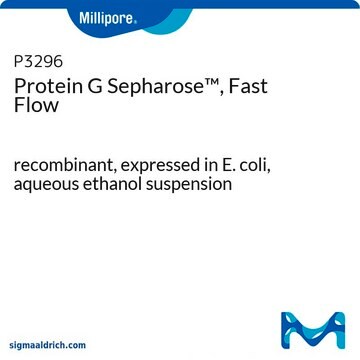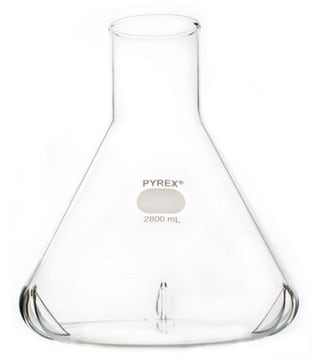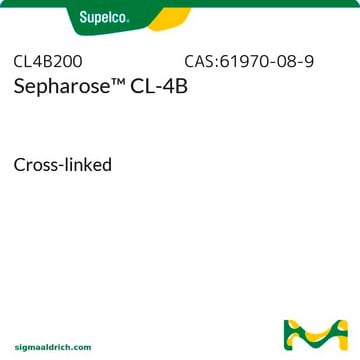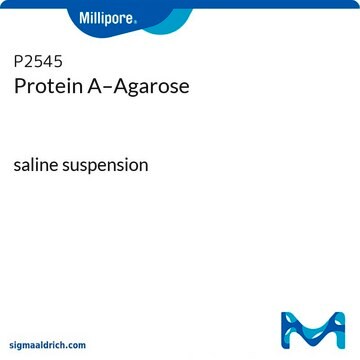GE17-0963-03
Protein A Sepharose™ Cl-4B
Cytiva 17-0963-03, pack of 25 mL
Synonym(s):
Protein A Column, Sepharose 4B
Sign Into View Organizational & Contract Pricing
All Photos(1)
About This Item
UNSPSC Code:
41106500
NACRES:
NA.56
Recommended Products
ligand
native protein A
packaging
pack of 25 mL
manufacturer/tradename
Cytiva 17-0963-03
storage condition
(20% Ehtanol)
matrix
4% cross-linked agarose
particle size
45-165 μm
average diameter
90 μm
cleaning
2-10
working range
3-9
capacity
~40 mg binding capacity (histidine-tagged protein/ml medium when changed with Ni2+)(Protein- and metal-ion dependent.)
storage temp.
2-8°C
General description
Protein A Sepharose™ CL-4B is a classic, well documented medium for immunoglobin purification and fractionation, and is suitable for immunoprecipitation procedures.
Protein A binds to the Fc region of immunoglobulins through interactions with the heavy chain. The binding of protein A has been well documented for IgG from a variety of mammalian species and for some IgM and IgA as well. Protein A Sepharose™ CL-4B has been used as a powerful tool to isolate and purify classes, subclasses and fragments of immunoglobulins from biological fluids and from cell culture media. Since only the Fc region is involved in binding, the Fab region is available for binding antigen.
Protein A binds to the Fc region of immunoglobulins through interactions with the heavy chain. The binding of protein A has been well documented for IgG from a variety of mammalian species and for some IgM and IgA as well. Protein A Sepharose™ CL-4B has been used as a powerful tool to isolate and purify classes, subclasses and fragments of immunoglobulins from biological fluids and from cell culture media. Since only the Fc region is involved in binding, the Fab region is available for binding antigen.
pH below 3 is sometimes required to elute strongly bound IgG species. However, protein ligands may hydrolyze at very low pH.
Features and Benefits
- Well documented for immunoglobulin purification and fractionation
- Strong binding to Fc region of IgG
- High capacity - 20 mg human IgG/mL.
- Suited for immunoprecipitation procedures
Storage and Stability
Please be aware this product may be shipped 90 days before the expiration date. For more information on the batch specific expiration date, please contact technical service.
Analysis Note
To view the Certificate of Analysis for this product, please visit www.cytiva.com.
Legal Information
Sepharose is a trademark of Cytiva
Signal Word
Warning
Hazard Statements
Precautionary Statements
Storage Class Code
3 - Flammable liquids
Choose from one of the most recent versions:
Certificates of Analysis (COA)
Lot/Batch Number
Sorry, we don't have COAs for this product available online at this time.
If you need assistance, please contact Customer Support.
Already Own This Product?
Find documentation for the products that you have recently purchased in the Document Library.
Customers Also Viewed
Joonbeom Bae et al.
Nature communications, 10(1), 3496-3496 (2019-08-04)
The timely mobilization of hematopoietic stem and progenitor cells (HSPCs) is essential for maintaining hematopoietic and tissue leukocyte homeostasis. Understanding how HSPCs migrate between bone marrow (BM) and peripheral tissues is of great significance in the clinical setting, where therapeutic
Lisa-Marie Sattler et al.
PloS one, 16(4), e0249639-e0249639 (2021-04-03)
Polycystic ovarian syndrome (PCOS) is a complex disease with different subtypes and unclear etiology. Among the frequent comorbidities are autoimmune diseases, suggesting that autoantibodies (aAb) may be involved in PCOS pathogenesis. As the gonadal axis often is dysregulated, we tested
Lijun Cong et al.
mBio, 12(4), e0192021-e0192021 (2021-08-25)
Human immunodeficiency virus (HIV) remodels the cell surface of infected cells to facilitate viral dissemination and promote immune evasion. The membrane-associated viral protein U (Vpu) accessory protein encoded by HIV-1 plays a key role in this process by altering cell
Karen Cortés-Sarabia et al.
Applied microbiology and biotechnology, 104(14), 6173-6183 (2020-05-29)
Bacterial vaginosis is one of the most frequent vaginal infections. Its main etiological agent is Gardnerella vaginalis, which produces several virulence factors involved in vaginal infection and colonization, in particular, sialidase (SLD), a potential clinical biomarker that participates in immune
Our team of scientists has experience in all areas of research including Life Science, Material Science, Chemical Synthesis, Chromatography, Analytical and many others.
Contact Technical Service










